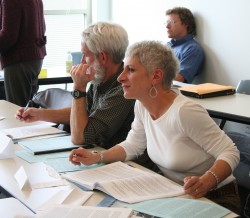 Faculty members listen intently as a debate ensues about the American Revolution at this weekend’s “Reacting to the Past” regional conference. |
CONTACT: John Burney, 515-360-8076, john.burney@drake.edu;
Katie Knorovsky, 515-271-1834, katie.knorovsky@drake.edu
Drake University will transform into a faculty’s playground this month when students leave campus for Spring Break. And to the uninformed onlooker, things might seem a bit bizarre.
That’s because more than 30 faculty members from around the country will convene at Drake for a weekend of elaborate role-playing. Led by Drake College of Arts and Sciences Dean John Burney, this spring’s “Reacting to the Past” regional conference will be held March 23-25 on behalf of a consortium of 35 colleges and universities. A full schedule of activities is included below.
The conference will feature the innovative teaching method known as “Reacting to the Past,” a curriculum that won the 2004 Theodore Hesburgh Award as the nation’s outstanding pedagogical innovation in higher education. Pioneered by Barnard College in New York, the curriculum features elaborate games in which students are introduced to major ideas and classic texts using a role-playing format. They reenact the historical context in which ideas acquired significance and seek to reach their own decisions on basic questions of political and social order.
To learn how to most effectively incorporate the pedagogy into classrooms, where they will serve as gamemasters, conference participants will reenact scenarios from Athens in 403 B.C., New York City in the American Revolution and apartheid-controlled South Africa in 1993. Game session leaders will be John Eby, associate professor of history at Loras College, Bill Offutt, associate professor of history and director of the Pforzheimer Honors College at Pace University, and Nicolas Proctor, associate professor of history at Simpson College.
In addition to the game sessions, participants will discuss the general character of a liberal arts education, student motivation and the problems and possibilities of the pedagogy.
“Students can have emotional reactions to classical texts, and role-playing really builds those connections,” Burney said.
The “Reacting to the Past” pedagogy is used at Drake in a first-year seminar called Debating Democracy: The Struggle to Create Democratic Unity in France (1791) and India (1946).
In addition to Drake faculty members, participants will attend from Barnard College, College of St. Benedict and St. John’s University, College of Staten Island, Culver College, Hilbert College, Hunter College, Loras College, Mount Mercy College, Pace University, Simpson College, Union College, University of Central Missouri, University of Georgia, University of Kansas and University of South Dakota.
All conference sessions will be held on the second floor of Olin Hall, 27th Street and Forest Avenue. The schedule follows:
• Friday, March 23
o 8:30-9 a.m.: Continental Breakfast
o 9:15-10 a.m.: Welcome and Introduction
o 10 a.m.-12:30 p.m.: Game Set-up – Track 2: Athens. Track 2: New York.
o 12:30 1:30 p.m.: Lunch
o 1:30-3:30 p.m.: Game session
o 3:30-4 p.m.: Break and Caucus
o 4-5 p.m.: Game Session (continued)
o 5 to 6 p.m.: Plenary Session: The Student Experience
o 6 p.m.: Reception
• Saturday, March 24
o 8:30-9 a.m.: Continental Breakfast
o 9-11 a.m.: Game Session – Track 1: Athens continued. Track 2: End of New York mini-game.
o 11-11:15 a.m.: Break
o 11:15 a.m.-12:15 p.m.: Plenary Session: “Reacting” and the Crisis in General Education
o 12:15-1 p.m.: Lunch
o 1-1:30 p.m.: Track 1: Faction Meetings. Track 2: Introduction to South Africa mini-game.
o 1:30-3:15 p.m.: Game Session – Track 1: Athens. Track 2: South Africa.
o 3:15-4:15 p.m.: Plenary Session: Fitting “Reacting” into the Curriculum
o 4:15-5:15 p.m.: Game Session or Faction Meetings
• Sunday, March 25
o 8:15-9 a.m.: Full Breakfast/Brunch
o 9-11:15 a.m.: Final Game Session – Track 1: Athens. Track 2: South Africa.
o 11:15 a.m.-12 p.m.: General Post-mortem

